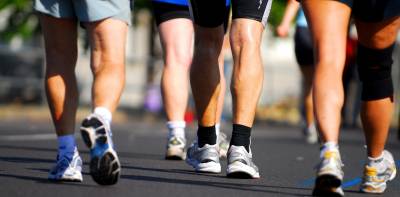Work and High Blood Pressure - is there a link?
Thursday, April 23, 2015

Blood pressure is a measure of how well the blood is able to flow through arteries. It's important that blood can flow freely, because it carries vital oxygen and nutrients to your heart. It's normal for blood pressure to increase when a person does hard physical exercise, feels stressed or anxious.
But if your blood pressure is higher than the healthy level when you're resting, you have high blood pressure (hypertension).
So, what is normal blood pressure? Ideally, we should all have blood pressure below 120 over 80 (120/80). At this level, we have a much lower risk of heart disease or stroke.
Healthy blood flow can be affected by these circumstances:
- Stress – Causes arteries to narrow
- High fat and salt diet - Artery walls get blocked and brittle through hard cholesterol deposits
- Smoking - Arteries narrowed by chemicals in cigarette smoke
- Anxiety - Heart is pumping too fast or pounding
How Hypertension Impacts Health
High blood pressure (hypertension) is a major risk factor for heart disease, stroke, heart failure, peripheral vascular disease, kidney failure and impaired vision. The risk of disease increases as the level of blood pressure rises and it's very important to get it checked regularly to prevent serious medical conditions developing. People over 40 should have their blood pressure checked at least once a year because preventative medicine is very effective.

Work Related Injuries
Most people with high blood pressure don't have any symptoms and don't get the treatment they require until they have a heart attack or stroke.
However, those who do continue to attend work (whilst suffering from the headaches and impaired vision HBP can cause), work less efficiently than healthier co-workers. HBP is more common in men, and as men are notoriously bad at consulting their doctor, it makes a lot of sense to bring in an ergonomics medical team to test your personnel at work. Workers with hypertension can then see their own doctor and receive one of the many available treatment medications.
Without treatment, the condition simply progresses over time. You could be at risk of black-outs; making undiagnosed HBP sufferers a danger on the factory floor. Machine operators with undiagnosed hypertension can also cause serious work-related injuries to themselves and others. This fact alone is a very convincing argument in favour of employer-led health screening, which can be arranged by an ergonomics consultancy and include essential pre-employment health checks.
Job Stress
Work-related stress is one of the major causes of high blood pressure and lost productivity in Australia and costs employers $10.11 billion a year. An ergonomics assessment of all aspects of your business from office design, work stations and the layout of machinery (including the opinions of your employees), allows the causes of workplace stress to be removed.
This greatly enhances morale and job performance and leads to high staff retention rates. Furthermore, an Injury Prevention Programme can be tailor-made to train workers in essential safety procedures, which also improves job satisfaction and productivity.
Health advice
In-house health screening days can also identify other common risk factors for heart disease/stroke such as high cholesterol, chest pain and obesity. An ergonomics health team can educate your personnel about the small life-style changes they can make to prevent illness - such as healthy eating and how to fit more physical activity into a busy daily routine.
When employers demonstrate the importance of staff welfare, it creates a positive attitude in workers towards all aspects of their health. Job satisfaction is also enhanced through the feeling of being valued. This translates into enhanced performance, high staff retention and a significant reduction in sick leave. Therefore, employers who invest in the long term health of their workforce receive an outstanding financial return - both in the short and the long term.
GWP has you covered for Healthy Workplace Audits - check out www.gwwc.com.au

How to Lower your Blood Pressure
1. Eat less salt
Too much salt raises your blood pressure, so it is important to eat as little as possible. In fact, some people with high blood pressure may be able to avoid blood pressure medicines by cutting down on salt.
Most of the salt you eat is not what you add to your food, but is in prepared foods like bread, breakfast cereals and ready meals. Don't add salt to food when cooking or at the table. When shopping for food, check the labels and choose low-salt options when you can.
2. Eat more fruit and vegetables
Eating more fruit and vegetables helps to lower your blood pressure. Adults should eat at least five portions of fruit and vegetables every day. A portion is 80 grams, or roughly the size of your fist.
Try to eat a range of different fruits and vegetables. Dried, frozen and tinned are fine, but watch out for added salt, sugar or fats.

3. Keep to a healthy weight
Losing weight, if you need to, will help lower your blood pressure and reduce your risk of health problems. The best way to lose weight is to choose more low-fat and low-calorie foods, and increase your physical activity.
Set yourself realistic goals. Make small changes to your eating habits and activity levels that you can keep to for life.
4. Drink less alcohol
If you drink too much alcohol, this will raise your blood pressure over time. The current recommended limits are 21 units of alcohol a week for men, and 14 units a week for women. A unit is roughly half a pint of beer or cider, a small glass of wine, or a single pub measure of spirits.
If you keep to the recommended alcohol limits, this should help keep your blood pressure down.
5. Get more active
Being moderately active for 30 minutes five times a week can keep your heart healthy, and can lower your blood pressure. If you can't find 30 minutes in your day, increasing your activity by even a small amount can help.
Think about how you can be more active in your daily life. Any activity that leaves you feeling warm and slightly out of breath is ideal.

